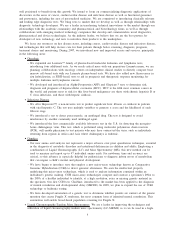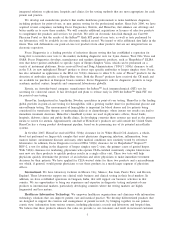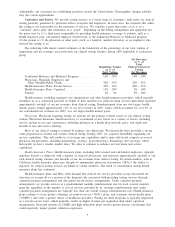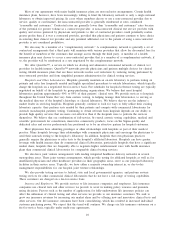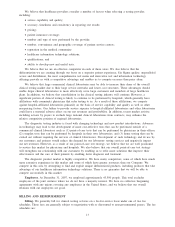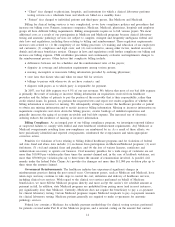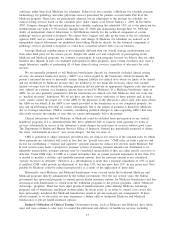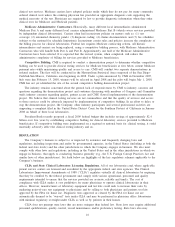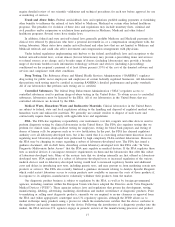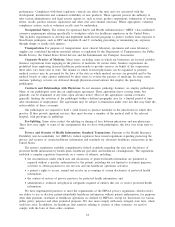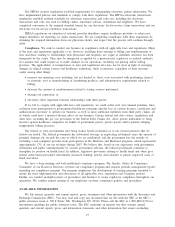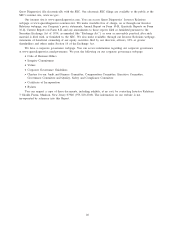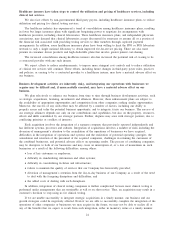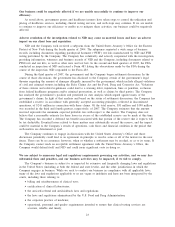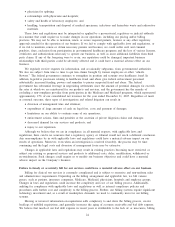Quest Diagnostics 2007 Annual Report Download - page 23
Download and view the complete annual report
Please find page 23 of the 2007 Quest Diagnostics annual report below. You can navigate through the pages in the report by either clicking on the pages listed below, or by using the keyword search tool below to find specific information within the annual report.•“Client” fees charged to physicians, hospitals, and institutions for which a clinical laboratory performs
testing services on a wholesale basis and which are billed on a monthly basis.
•“Patient” fees charged to individual patients and third-party payers, like Medicare and Medicaid.
Billing for clinical testing services is very complicated, so we have compliance policies and procedures that
increase our billing costs. Patients, insurance companies, Medicare, Medicaid, physicians, hospitals and employer
groups all have different billing requirements. Billing arrangements require us to bill various payers. We incur
additional costs as a result of our participation in Medicare and Medicaid programs because clinical laboratory
testing and anatomic pathology services are subject to complex, stringent and frequently ambiguous federal and
state laws and regulations, including those relating to billing and reimbursement. These regulatory requirements
increase costs related to: (1) the complexity of our billing processes; (2) training and education of our employees
and customers; (3) compliance and legal costs; and (4) costs related to, among other factors, medical necessity
denials and advance beneficiary notices. Changes in laws and regulations could further complicate our billing and
increase our billing expense. CMS establishes procedures and continuously evaluates and implements changes to
the reimbursement process. Other factors that complicate billing include:
•differences between our fee schedules and the reimbursement rates of the payers;
•disparity in coverage and information requirements among various payers;
•missing, incomplete or inaccurate billing information provided by ordering physicians;
•state laws that dictate who and when we must bill for services;
•billings to payers with whom we do not have contracts; and
•disputes with payers as to which party is responsible for payment.
In 2007, our bad debt expense was 4.5% of our net revenues. We believe that most of our bad debt expense
is primarily the result of missing or incorrect billing information on requisitions received from healthcare
providers and the failure of patients to pay the portion of the receivable that is their responsibility, rather than
credit related issues. In general, we perform the requested tests and report test results regardless of whether the
billing information is incorrect or missing. We subsequently attempt to contact the healthcare provider or patient
to obtain any missing information and to rectify incorrect billing information. Missing or incorrect information on
requisitions complicates and slows down the billing process, creates backlogs of unbilled requisitions and
generally increases the aging of accounts receivable and bad debt expense. The increased use of electronic
ordering reduces the incidence of missing or incorrect information.
Billing Compliance. As an integral part of our billing compliance program, we investigate reported failures
or suspected failures to comply with federal and state healthcare reimbursement requirements. Any Medicare or
Medicaid overpayments resulting from non-compliance are reimbursed by us. As a result of these efforts, we
have periodically identified and reported overpayments, reimbursed the overpayments and taken appropriate
corrective action.
Penalties for violations of laws relating to billing federal healthcare programs and for violations of federal
and state fraud and abuse laws include: (1) exclusion from participation in Medicare/Medicaid programs; (2) asset
forfeitures; (3) civil and criminal fines and penalties; and (4) the loss of various licenses, certificates and
authorizations necessary to operate our business. Civil monetary penalties for a wide range of violations are not
more than $10,000 per violation plus three times the amount claimed and, in the case of kickback violations, not
more than $50,000 per violation plus up to three times the amount of remuneration involved. A parallel civil
remedy under the federal False Claims Act provides for damages not more than $11,000 per violation plus up to
three times the amount claimed.
Government Reimbursements. The healthcare industry has experienced significant changes in
reimbursement practices during the past several years. Government payers, such as Medicare and Medicaid, have
taken steps and may continue to take steps to control the cost, utilization and delivery of healthcare services,
including clinical test services. With regard to the clinical test services performed on behalf of Medicare
beneficiaries, we must bill the Medicare program directly and must accept the carrier’s fee schedule amount as
payment in full. In addition, state Medicaid programs are prohibited from paying more (and in most instances,
pay significantly less) than Medicare. Currently, Medicare does not require the beneficiary to pay a co-payment
for clinical laboratory testing. Certain Medicaid programs require Medicaid recipients to pay co-payment amounts
for clinical laboratory testing. Medicare patients generally are required to make co-payments for anatomic
pathology services.
Federal law contains a Medicare fee schedule payment methodology for clinical testing services performed
for patients covered under Part B of the Medicare program, and a national ceiling on the amount that carriers
14



